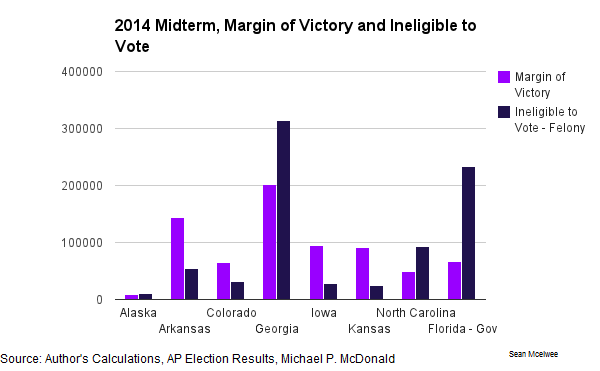Chart: Why Felon Disenfranchisement Matters
The margin of victory in several high-profile and highly-contested Senate races this election was much smaller than the number of felons ineligible to vote.
Via Demos' Sean McElwee, here's an interesting look at the extent to which disenfranchisement of those with felony convictions may influence election outcomes. In several high-profile and highly-contested Senate races this election, the margin of victory was much smaller than the number of felons ineligible to vote:

Is this to say all those felons would have voted if they were allowed, or would have voted in a way that changed these races' outcomes? Of course not. But it does support the idea that restoring felons' voting rights could have a political impact.
Dara Lind recently took at look at state differences in disenfranchisement policies. With the exception of Maine and Vermont, all states prohibit those currently incarcerated for a felony from voting. The majority (including Alaska, Georgia, and North Carolina) prohibit those on parole or probation for a felony crime from voting. And in 12 states (including Florida), those with felony convictions are stripped of voting rights even after they've completed their sentence, in some cases forever. "As a result, according to the Sentencing Project, 5.8 million American citizens have lost their voting rights through the criminal-justice system," writes Lind. "And one in every thirteen African-American citizens has lost his or her right to vote this way."
According to the latest Reason-Rupe poll, nearly three-quarters of Americans favor restoring voting rights to at least some felons: those convicted of non-violent drug offences. In June, Sen. Rand Paul introduced legislation to restore voting rights to all non-violent felony offenders.
It's a start, at least. I agree with my colleague Jacob Sullum (and the ACLU) that anyone who has served their time for the crime they committed should have their voting rights restored upon release. "It has never made sense to me," writes Sullum, 'that committing a felony should forever turn someone into a second-class citizen, which contradicts the goal of reintegrating people into society after they've completed their sentences."
More state-by-state info on felon voting rights here.


Show Comments (43)